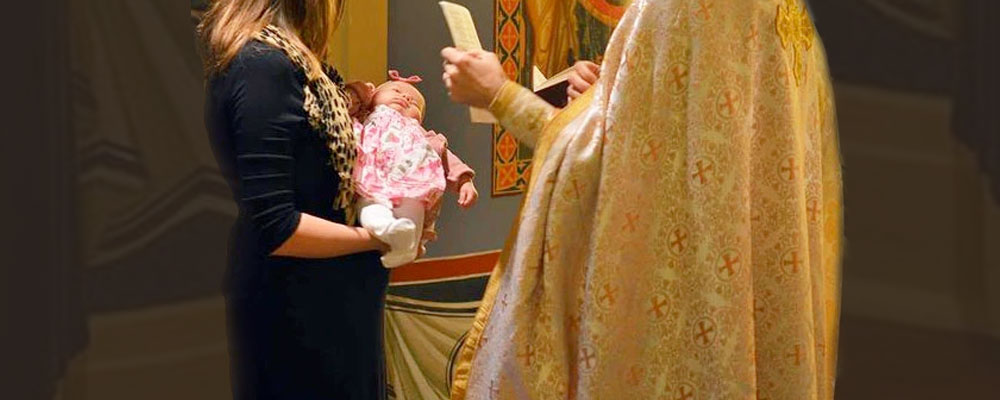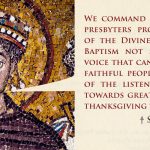
Let’s make the “churching prayers” non-offensive
Originally posted in February, 2014
Today a grandmother asked me if I could go to the hospital and offer a prayer for their new granddaughter that was born yesterday. She was troubled that the first day on which this prayer is offered had already passed. I told her that it was within 24 hours, and even if it was not, what difference would it make? (Do we keep a timer in our hands when we pray?) I congratulated her for her new granddaughter, and for requesting to do a prayer service, a service which most people are not even aware exists.
Before going to the hospital I reviewed the service carefully, because I was fully aware that certain wording in the prayers presented some problems and they had bothered me for some time. This was a faithful Orthodox Christian family, and educated. If they were to pay close attention to the wording they might view the prayers as offensive. So I decided to edit them. I would like to share with you my reasons for doing so.
The prayers upon the delivery of a child and the prayers for a woman who has just given birth (said on the day after the birth of her child) are three. The person for whom all three of these prayers is offered is the mother, who is named. The child is not named, because a name is not given until the eighth day (we will address this service in our next post). The first prayer includes a simple request for the child: “Keep her safe and also the present infant”, and so also the second prayer: “Have mercy on her…and protect the child born of her.” Protect the child from what? A few of the dangers named are “bane”(!!), “distress by the adversary” and “evil spirits of the day and night.” Requests for the mother are protection from “diabolical cruelty,” “tyrannical oppression of the devil,” “attack by invisible spirits,” “jealousy,” “envy” and “the evil eye”!
There are two main requests for the mother. The first is for “cleansing from the defilement” (mentioned twice in the second prayer, that specifies, “bodily defilement”). “Defilement” is also mentioned in the first prayer, in which reference is made to the “Davidic utterance”: “We were conceived in transgressions, and are all defiled before You.”1 The first part of the “Davidic utterance” (note: without the plural) comes from the 50th Psalm (51st in western Bibles), but the second part (“and are all defiled before You”) does not.
The second request for the mother is for the “forgiveness of her sins” (third and second prayers add “voluntary and involuntary”). Forgiveness for what? For giving birth to a child born within the “great mystery” of marriage (Eph. 5:32), which is holy sacrament? This is not a prayer; it is a condemnation of marriage that addresses the mother as if she had committed a crime (and for forty days she is viewed and treated as a penitent in need of forgiveness before she can once more become a partaker of the sacred mysteries).
Instead of congratulations the priest prays for the forgiveness even of those “who have touched her”! Since on account of giving birth she has been rendered ritually “unclean” (Lev. 12:1-4), those who touch her also become unclean! (Lev. 5:2-3) But the Lord has freed us from these Jewish practices: “If with Christ you died to the elemental spirits of the universe, why do you live as if you still belonged to the world? Why are you subjected to regulations: ‘Do not handle, Do not taste, Do not touch?’” (Col. 2:20-21)
Behind all the prayers looms the unorthodox understanding of the “original sin.” But in the Orthodox Church we never understood the original sin as a personal sin for which we should feel guilty. It is the sin of our ancestors, called appropriately in the Orthodox Church “ancestral sin.” Of course we all bear its consequences (corruption, suffering, death, confusion of mind and feebleness of will, together with a propensity to sin followed by actual sin), but we inherit no guilt. These prayers do not reflect the resurrectional ethos and the phronema of the Church. They belong to the Middle Ages, and reflect the mindset of the West, which is more akin to Judaism than to Christianity.
To conclude, it is my opinion that this prayer service is offensive to the mother, to her family and to those present, and is in need of a complete overhaul. I believe that on an occasion as joyous as this, it would be preferable to offer thanks to the life-giving God for a safe delivery, for giving the family the gift of life, and to bestow the Church’s blessing upon a new member in the making. It is also my suggestion that the priest’s Prayer Book should be enriched with a prayer for safe labor and delivery, a prayer for the unborn child, and a prayer for a couple that wants to have a child.
Comments?
- Wording from the Book of Needs of the Holy Orthodox Church. The Service may be found online here. See also the translation by Isabel Florence Hapgood, from which the third prayer is missing, and a translation on this site of a Cypriot priest. The text in Greek is found here, pp. 140-41

